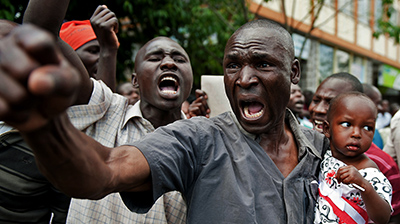Amid a tense presidential election, Kenyans have avoided a repeat of the deadly violence that followed the vote in 2007, when half a million people were uprooted and more than 1,000 people were killed. Still, the situation today is fraught. Ethnic identity dominates the nation’s political divisions–and those same loyalties can undermine solidarity in the press corps.
I’ve learned of the importance of solidarity from colleagues in nations such as El Salvador, Mali, Turkey, and Brazil. They stress the need to overcome ideological, regional, and sectarian divisions so they can speak as one when a journalist or newsroom is attacked. I explored this critical issue last month in an essay, “Lessons From El Salvador: Security Begins With Solidarity” that was published as part of CPJ’s new anthology Attacks on the Press.
But forging solidarity can be challenging in a nation where an increasing number of media outlets are reporting in different languages. “The growth of ethnic language radio stations has resulted in a huge listenership growing for them,” wrote Maina Kiai, former chairman of the Kenya National Commission on Human Rights in a 2010 paper for the U.S. Holocaust Memorial Museum. “There is a tendency to trust more ‘our own’ news” than coverage in other languages.
In Kenya, presidential candidate Uhura Kenyatta won just over 50 percent of the vote last week in what was largely a three-way race. The runner-up, Raila Odinga, claimed the vote was “tainted” but has pledged to take his case to the courts rather than the streets. (Kenyatta faces an indictment by the International Criminal Court on charges that he orchestrated post-election violence in 2007.)
In the days before the voting this year, paramilitary police attacked journalists in different areas of the nation. Another journalist was threatened after he wrote a story about candidates bribing voters. In the months before, numerous journalists were harassed, intimidated or assaulted in politically inspired attacks.
In the face of such ongoing tension, reporters in Kenya might take a cue from Shaka Ssali, a Ugandan-born journalist and host of the Voice of America program “Straight Talk Africa.” Ssali describes himself as belonging to the “tribe of journalists.” Journalists on other continents have put it in much the same way. Forging solidarity in the press corps is among the best ways for journalists to stay safe.
